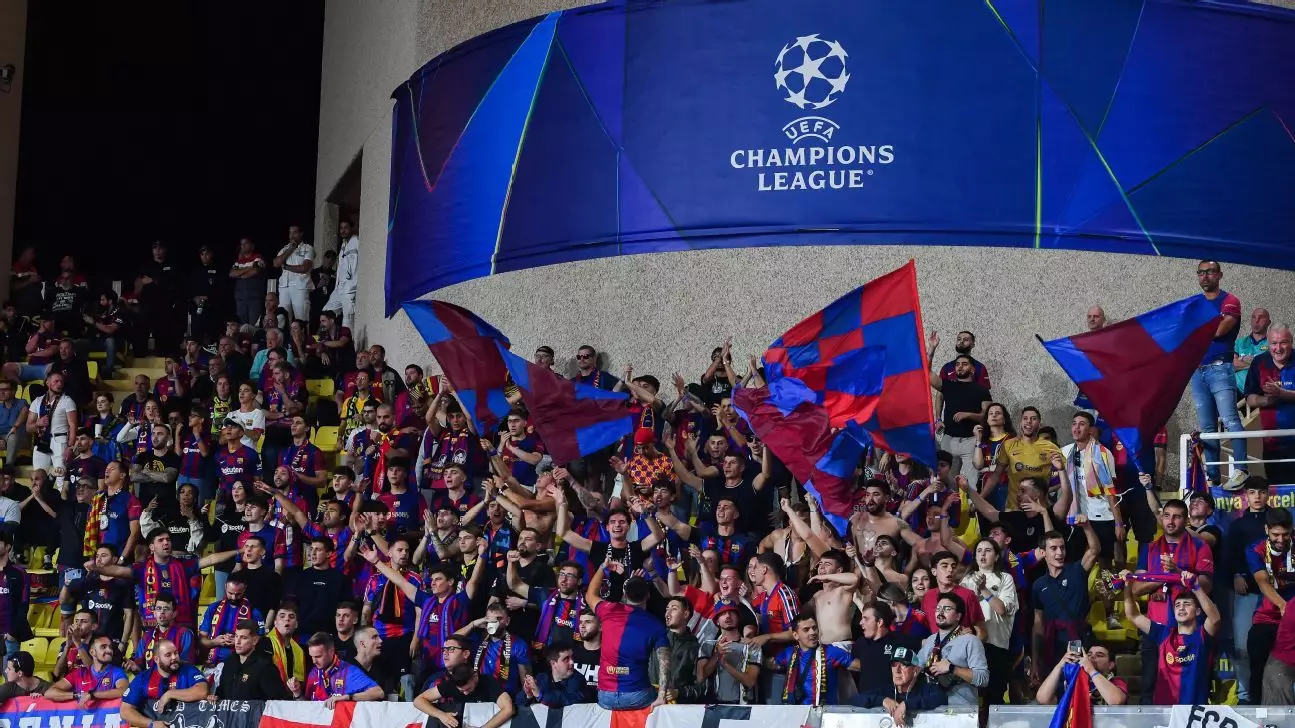In a significant disciplinary action, UEFA has levied a €10,000 (approximately $11,157) fine on FC Barcelona and prohibited their fans from attending the club’s upcoming away match in the Champions League. This decision stems from a disturbing incident where supporters displayed Nazi symbols during a match against AS Monaco. Such behavior not only tarnishes the reputation of the club but also raises serious questions about the culture permeating through fan bases in football. The incident took place at the Stade Louis II, where multiple violations of UEFA’s strict regulations on racism and discrimination were recorded.
The match, which ended in a disappointing 2-1 loss for Barcelona, becomes a questionable footnote in the club’s history. Beyond the immediate impact of this punishment, there is a longer-lasting stigma being attached to the supporters who express such hateful ideologies. The absence of Barcelona’s passionate fans at the November 6 fixture against Crvena Zvezda in Belgrade, Serbia, is a visible manifestation of disciplinary measures against such infractions.
This isn’t the first time Barcelona has found itself in hot water; the club faced similar charges after their Champions League quarterfinal against Paris Saint-Germain in April 2024. At that time, they were fined €25,000 due to Nazi salutes and racist gestures from fans, indicating that the issue is not isolated. UEFA’s Control Ethics and Disciplinary Body pointed out that the recent penalties take into consideration the repeated nature of such offenses, enforcing a suspended sanction meant to deter future misbehavior.
These incidents raise alarming concerns regarding identifiable factions within a fan base that feel empowered to express hate and discrimination. Such acts do not only disrupt the unifying spirit of sport but also challenge the universal values that clubs like FC Barcelona purport to stand by.
In light of the recent sanctions, Barcelona’s vice president, Elena Fort, expressed her disgust regarding the incident, emphasizing that it was “disgraceful.” Her statement underscores an essential reality: for a club that champions inclusivity and dignity, such behavior contradicts its foundational values. Fort’s remark serves as a stark reminder of the limits of fandom; it is critical for all stakeholders—including clubs, governing bodies, and fans themselves—to recognize that there is no room for hate in football.
In a subsequent statement, FC Barcelona assured compliance with UEFA’s sanctions and pledged to refund fans who had already purchased tickets for the upcoming match in Belgrade. The club vehemently rejected any form of violence or discrimination and reiterated its commitment to uphold the principles enshrined in the Universal Declaration of Human Rights. Barcelona also declared intentions to bolster existing measures to prevent the recurrence of such behavior, ensuring accountability and respect for the game.
These developments serve as a clarion call not only for FC Barcelona but for football clubs globally. The sport holds profound influence and power; thus, it is essential that the footballing community, including fans, players, and club administrations, actively denounce racially charged behavior. Cultural change is overdue in an environment that increasingly sees manifestations of hate amid the excitement and passion that characterize matches.
Head coach Hansi Flick’s remark, resonating with Fort’s sentiments, indicates a collective understanding about the gravity of the situation. By declaring that every word uttered in defense of racism is “too much,” he not only acknowledges the problem but also aligns with the voice of reason that is desperately needed in the face of persistent discrimination.
Ultimately, the sanctions imposed on FC Barcelona serve both as a punishment for certain fans who engaged in disgraceful behavior and as a cautionary lesson for all clubs. The response from club officials must translate into meaningful action against hate and discrimination, reinforcing the idea that uttering hate, even in the name of support for a club, is unacceptable. This incident should become a turning point, championing the need for unity and respect that transcends race, ideology, and boundaries. Football is not merely a game, but a platform for cultural exchange—a responsibility that demands vigilance, commitment, and accountability from everyone involved.
